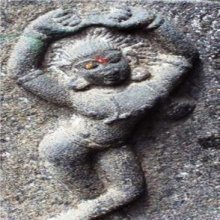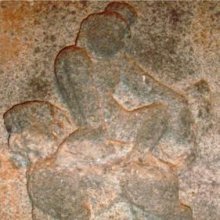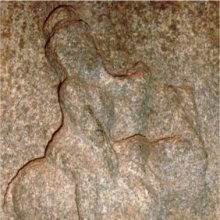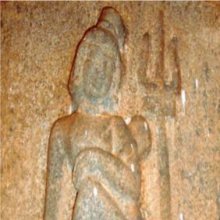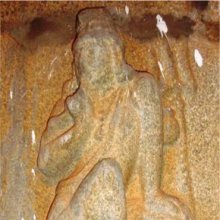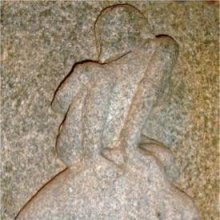Natha, Nātha: 26 definitions
Introduction:
Natha means something in Buddhism, Pali, Hinduism, Sanskrit, Jainism, Prakrit, the history of ancient India, Marathi, Hindi. If you want to know the exact meaning, history, etymology or English translation of this term then check out the descriptions on this page. Add your comment or reference to a book if you want to contribute to this summary article.
Images (photo gallery)
(+65 more images available)
In Hinduism
Purana and Itihasa (epic history)
Source: archive.org: Shiva Purana - English TranslationNātha (नाथ) is used as an epithet for Śiva, according to the Śivapurāṇa 2.2.41.—Accordingly, as Viṣṇu and others eulogized Śiva:—“[...] obeisance to Vāma, Vāmarūpa, Vāmanetra, Aghora, the great lord and the Vikaṭa. Obeisance to Tatpuruṣa, to Nātha, the ancient Puruṣa, the bestower of the four aims of life, Vratin, and Parameṣṭhin. Obeisance to you, Īśānas, Īśvara, Brahman, of the form of Brahman, the Supreme Soul”.
Source: Cologne Digital Sanskrit Dictionaries: The Purana IndexNātha (नाथ).—A Vaikuṇṭha God from the root meaning, protection.*
- * Brahmāṇḍa-purāṇa II. 36. 57; Vāyu-purāṇa 64. 19.

The Purana (पुराण, purāṇas) refers to Sanskrit literature preserving ancient India’s vast cultural history, including historical legends, religious ceremonies, various arts and sciences. The eighteen mahapuranas total over 400,000 shlokas (metrical couplets) and date to at least several centuries BCE.
Natyashastra (theatrics and dramaturgy)
Source: Wisdom Library: Nāṭya-śāstraNātha (नाथ, “lord”) refers to a term to be used by women in love addressing their beloved during amorous union, according to the Nāṭyaśāstra chapter 24. Accordingly “he who maintains an intercourse with a woman by sweet words (sāma, lit. conciliation), gifts (dāna), providing enjoyment, caress and maintinance, is called ‘lord’ (nātha)”

Natyashastra (नाट्यशास्त्र, nāṭyaśāstra) refers to both the ancient Indian tradition (shastra) of performing arts, (natya—theatrics, drama, dance, music), as well as the name of a Sanskrit work dealing with these subjects. It also teaches the rules for composing Dramatic plays (nataka), construction and performance of Theater, and Poetic works (kavya).
Shaivism (Shaiva philosophy)
Source: Nirvāṇa Sundarī: A Note on Kula and Kaula TantraNātha (नाथ).—The Siddhas and their sons are referred to as -nāthas (e.g. Macchandanātha, Guḍikānātha) and the consorts as -ambās (e.g. Koṅkaṇāmbā/Kuṅkaṇāmbā, Illāī-ambā).

Shaiva (शैव, śaiva) or Shaivism (śaivism) represents a tradition of Hinduism worshiping Shiva as the supreme being. Closely related to Shaktism, Shaiva literature includes a range of scriptures, including Tantras, while the root of this tradition may be traced back to the ancient Vedas.
Jyotisha (astronomy and astrology)
Source: Wisdom Library: Brihat Samhita by VarahamihiraNātha (नाथ) refers to the “commanders (of armies)”, according to the Bṛhatsaṃhitā (chapter 16) (“On the planets—graha-bhaktiyoga”), an encyclopedic Sanskrit work written by Varāhamihira mainly focusing on the science of ancient Indian astronomy astronomy (Jyotiṣa).—Accordingly, “The Moon presides over citadels fortified by hills or by water, over Kosala, Bharukaccha, the sea, the city of Roma, the country of Tuṣāra, dwellers in forests, the islands of Taṅgaṇa, Hala and Strīrājya in the big seas. [...] She also presides over fine white horses, charming young women, commanders of armies (camū-nātha), articles of food, clothes, horned animals, the Rākṣasas, farmers and Śrotiyas. [...]”

Jyotisha (ज्योतिष, jyotiṣa or jyotish) refers to ‘astronomy’ or “Vedic astrology” and represents the fifth of the six Vedangas (additional sciences to be studied along with the Vedas). Jyotisha concerns itself with the study and prediction of the movements of celestial bodies, in order to calculate the auspicious time for rituals and ceremonies.
In Buddhism
Theravada (major branch of Buddhism)
Source: Pali Kanon: Pali Proper Names1. Natha
Called Adhikari, a general of King Manabharana. Cv.lxx.298; lxxii.123, 126.
2. NathaCalled Natha Lankagiri. A general of King Manabharana, killed in battle (Cv.lxxii.124f).
3. Natha NagaragiriGeneral of Parakkamabahu I. He held the title of Sankhanayaka. Cv.lxx.318; lxxii.31, 107 ; lxxv.76.
Natha VaggaThe second chapter of the Dasaka Nipata of the Anguttara Nikaya. A.v.15 32.
Natha SuttaTwo suttas on the qualities which give protection to a monk: virtue, learning, good friends, affability, skill in performance of duties, fondness for truth, energy, contentment, mindfulness, wisdom. A.v.23f. 26f.
Theravāda is a major branch of Buddhism having the the Pali canon (tipitaka) as their canonical literature, which includes the vinaya-pitaka (monastic rules), the sutta-pitaka (Buddhist sermons) and the abhidhamma-pitaka (philosophy and psychology).
Tibetan Buddhism (Vajrayana or tantric Buddhism)
Source: Wisdom Library: Tibetan BuddhismNātha (नाथ) is the name of a Bodhisattva mentioned as attending the teachings in the 6th century Mañjuśrīmūlakalpa: one of the largest Kriyā Tantras devoted to Mañjuśrī (the Bodhisattva of wisdom) representing an encyclopedia of knowledge primarily concerned with ritualistic elements in Buddhism. The teachings in this text originate from Mañjuśrī and were taught to and by Buddha Śākyamuni in the presence of a large audience (including Nātha).

Tibetan Buddhism includes schools such as Nyingma, Kadampa, Kagyu and Gelug. Their primary canon of literature is divided in two broad categories: The Kangyur, which consists of Buddha’s words, and the Tengyur, which includes commentaries from various sources. Esotericism and tantra techniques (vajrayāna) are collected indepently.
Mahayana (major branch of Buddhism)
Source: academia.edu: A Study and Translation of the GaganagañjaparipṛcchāNātha (नाथ) refers to the “protectors”, according to the Gaganagañjaparipṛcchā: the eighth chapter of the Mahāsaṃnipāta (a collection of Mahāyāna Buddhist Sūtras).—Accordingly, “Then the Lord spoke the following verses to the Bodhisattva Puṇyālaṃkāra: ‘[...] (237) In the same way that I grasp the dharma of the protectors (nātha), I see living beings by the eye of the Buddha and teach them to be Śakras or Brahmās, but it does not increase merit that much. Even though I teach all those beings to be the worthy ones (Arhat) or to mount on the vehicle of the isolated Buddha, if there is someone who, having generated the thought of awakening, upholds the true dharma, then it would be better. [...]’”

Mahayana (महायान, mahāyāna) is a major branch of Buddhism focusing on the path of a Bodhisattva (spiritual aspirants/ enlightened beings). Extant literature is vast and primarely composed in the Sanskrit language. There are many sūtras of which some of the earliest are the various Prajñāpāramitā sūtras.
In Jainism
General definition (in Jainism)
Source: HereNow4u: Tīrthaṅkara (ford maker) and Kevalīs (omniscient)Nātha (नाथ).—Literal meaning of nātha is “Lord”. Each Tīrthaṅkara is the Lord of three worlds and enriched with great qualities. Hence it seems apt and appropriate to use the suffix “nātha” with their names. Prabhu, Nātha, Deva, Swāmī, etc. are synonymous terms, so the terms Deva, Nātha, Prabhu, and Swāmī have been suffixed to the names of Tīrthaṅkara. The term “nātha” for Jain Tīrthaṅkara became so popular that Śaiva Yogī started using the term 'nātha' with his name and as a result, Matsyendranātha, Gorakhanātha, etc. which was part of this tradition became popular as the “nātha sect”.

Jainism is an Indian religion of Dharma whose doctrine revolves around harmlessness (ahimsa) towards every living being. The two major branches (Digambara and Svetambara) of Jainism stimulate self-control (or, shramana, ‘self-reliance’) and spiritual development through a path of peace for the soul to progess to the ultimate goal.
India history and geography
Source: Cologne Digital Sanskrit Dictionaries: Indian Epigraphical GlossaryNātha.—(Ep. Ind., Vol. IX, p. 313), same as Nāyaka. Note: nātha is defined in the “Indian epigraphical glossary” as it can be found on ancient inscriptions commonly written in Sanskrit, Prakrit or Dravidian languages.

The history of India traces the identification of countries, villages, towns and other regions of India, as well as mythology, zoology, royal dynasties, rulers, tribes, local festivities and traditions and regional languages. Ancient India enjoyed religious freedom and encourages the path of Dharma, a concept common to Buddhism, Hinduism, and Jainism.
Languages of India and abroad
Pali-English dictionary
Source: BuddhaSasana: Concise Pali-English Dictionarynātha : (m.) protection; protector.
Source: Sutta: The Pali Text Society's Pali-English DictionaryNātha, (Ved. nātha, nāth, to which Goth. nipan (to support), Ohg. gināda (grace)) protector, refuge, help A. V, 23, 89; Dh. 160 (attā hi attano n.), 380; Sn. 1131 (Nd2 has nāga); DhA. IV, 117; PvA. 1. lokanātha Saviour of the world (Ep. of the Buddha) Sn. 995; PvA. 42.—anātha helpless, unprotected, poor J. I, 6 (nāthânāthā rich & poor); PvA. 3 (°sālā poor house) 65. Cp. nādhati. (Page 349)

Pali is the language of the Tipiṭaka, which is the sacred canon of Theravāda Buddhism and contains much of the Buddha’s speech. Closeley related to Sanskrit, both languages are used interchangeably between religions.
Marathi-English dictionary
Source: DDSA: The Molesworth Marathi and English Dictionarynatha (नथ).—f ( H from nātha S) A ring worn in the nose, a nose-jewel. 2 Medicine administered through the nose, errhine. v ghāla.
--- OR ---
nātha (नाथ).—m (S) A lord or master. Some compounds are naranātha, mṛganātha, bhaktanātha, śrīnātha, ambānātha. 2 The nose-rope or bridle of a bullock.
Source: DDSA: The Aryabhusan school dictionary, Marathi-Englishnatha (नथ).—f A ring worn in the nose. Medi- cine administered through the nose.
--- OR ---
nātha (नाथ).—m A Lord or master.
Marathi is an Indo-European language having over 70 million native speakers people in (predominantly) Maharashtra India. Marathi, like many other Indo-Aryan languages, evolved from early forms of Prakrit, which itself is a subset of Sanskrit, one of the most ancient languages of the world.
Sanskrit dictionary
Source: DDSA: The practical Sanskrit-English dictionaryNātha (नाथ).—[nāth-ac]
1) A lord, master; leader; नाथे कुतस्त्वय्यशुभं प्रजानाम् (nāthe kutastvayyaśubhaṃ prajānām) R.5.13;2.73;3.45; त्रिलोक°, कैलास° (triloka°, kailāsa°) &c. भर्तुनाथा हि नार्यः (bhartunāthā hi nāryaḥ) Pratimā 1.25; विजनेऽपि च नाथवानिवास्मि (vijane'pi ca nāthavānivāsmi) Bu. Ch.5.69.
2) A husband.
3) A rope passed through the nose of a draft-ox.
4) A possessor.
5) A protector; अनाथाया हि नाथस्त्वं कौसल्याया भविष्यसि (anāthāyā hi nāthastvaṃ kausalyāyā bhaviṣyasi) Rām.2.53.17.
Derivable forms: nāthaḥ (नाथः).
Source: Cologne Digital Sanskrit Dictionaries: Shabda-Sagara Sanskrit-English DictionaryNātha (नाथ).—m.
(-thaḥ) 1. A master, a lord. 2. A name of Siva, especially in the form of a Linga; it is usually compounded with some word relating to the legendary history of the Linga, as Somanatha, the Linga set up by Soma, &c. 3. A name adopted by a class of Yogis, as Gorakshanatha, &c. 4. A rope passed through the nose of a draft ox. E. nāth to ask, (from whom,) and ac aff.
Source: Cologne Digital Sanskrit Dictionaries: Benfey Sanskrit-English DictionaryNātha (नाथ).—[nāth + a], m. 1. A protector, Mahābhārata 2292. 2. A master, a lord, [Pañcatantra] v. [distich] 90; [Rāmāyaṇa] 1, 76, 19. 3. A husband, [Raghuvaṃśa, (ed. Stenzler.)] 12, 75.
Source: Cologne Digital Sanskrit Dictionaries: Cappeller Sanskrit-English DictionaryNātha (नाथ).—[neuter] refuge, aid; [masculine] protector, lord, husband; [often] adj. dependent on, occupied by, endowed with (—°).
Source: Cologne Digital Sanskrit Dictionaries: Aufrecht Catalogus Catalogorum1) Nātha (नाथ) as mentioned in Aufrecht’s Catalogus Catalogorum:—guru of Svātmārāma (Gorakṣanātha?). W. p. 195. Oxf. 233^b.
2) Nātha (नाथ):—Quoted by Kṣemarāja Hall. p. 198.
3) Nātha (नाथ):—a commentator on Kālidāsa’s poems. Quoted by Mallinātha Oxf. 113^a. 126^a.
4) Nātha (नाथ):—(?) son of Murāri: Praśnamārga jy.
Source: Cologne Digital Sanskrit Dictionaries: Monier-Williams Sanskrit-English Dictionary1) Nātha (नाथ):—[from nāth] n. refuge, help, [Atharva-veda; Taittirīya-brāhmaṇa]
2) [v.s. ...] m. a protector, patron, possessor, owner, lord (often ifc., [especially] in names of gods and men e.g. goviṅda-, jaganetc.; but also mf(ā)n. possessed of occupied by, furnished with cf. sa-)
3) [v.s. ...] m. a husband ([especially] in [vocative case]), [Mahābhārata; Kāvya literature] etc.
4) [v.s. ...] a rope passed through the nose of a draft ox, [cf. Lexicographers, esp. such as amarasiṃha, halāyudha, hemacandra, etc.]
5) [v.s. ...] Name of sub voce authors, [Catalogue(s)]
Source: Cologne Digital Sanskrit Dictionaries: Yates Sanskrit-English DictionaryNātha (नाथ):—(thaḥ) 1. m. A master, a lord; Shiva; a rope in the nose of oxen.
Source: DDSA: Paia-sadda-mahannavo; a comprehensive Prakrit Hindi dictionary (S)Nātha (नाथ) in the Sanskrit language is related to the Prakrit words: Nāha, Ṇāha.
[Sanskrit to German]
Sanskrit, also spelled संस्कृतम् (saṃskṛtam), is an ancient language of India commonly seen as the grandmother of the Indo-European language family (even English!). Closely allied with Prakrit and Pali, Sanskrit is more exhaustive in both grammar and terms and has the most extensive collection of literature in the world, greatly surpassing its sister-languages Greek and Latin.
Hindi dictionary
Source: DDSA: A practical Hindi-English dictionary1) Natha (नथ) [Also spelled nath]:—(nf) a nose-ring; nose-rope (for bullocks, etc.); —[utāranā] in feudal times, a ceremony amongst prostitutes when a young girl stepped into the family profession and was surrendered to a wealthy customer for the first time in return for enormous reward or consideration.
2) Nāṭha (नाठ) [Also spelled nath]:—(nf) ruination, destruction.
3) Nātha (नाथ) [Also spelled nath]:—(nm) a master, husband; nose-rope (of a bullock etc.); a member of the mediaeval religious sect called the [nāthapaṃtha; ~paṃtha] a mystical mediaeval religious sect; —[paṃthī] an adherent of the ~[paṃtha].
...
Kannada-English dictionary
Source: Alar: Kannada-English corpusNātha (ನಾಥ):—
1) [noun] a master; a protector; a patron; a ruler; a lord.
2) [noun] a man as related to a woman whom he is married to; a husband.
3) [noun] ನಾಥನಾದರೂ ಭೂತ ಬಿಡದು [nathanadaru bhuta bidadu] nātanādarū bhūta biḍadu (prov.) destiny never differentiates between the lord and the labour.
Kannada is a Dravidian language (as opposed to the Indo-European language family) mainly spoken in the southwestern region of India.
See also (Relevant definitions)
Starts with (+87): Na-talai-mativili, Na-tankipecu, Na-tankivay, Nata-nirvari, Nata-rupatarai, Natacaram, Natacayam, Natacuram, Natakitam, Natakkattu, Natakkiyai, Natakkumil, Natakkutam, Natalvar, Natam, Natan, Natanamakkiriyai, Natantam, Natanu, Nataputta.
Ends with (+532): Abhinandananatha, Acalanatha, Adharanatha, Adhilokanatha, Adhinatha, Adinatha, Adrinatha, Advayanandanatha, Adyanatha, Ahonatha, Ajitanatha, Alabdhanatha, Alalanatha, Alinatha, Allalanatha, Amaranatha, Amardakatirthanatha, Ambaranatha, Ambunatha, Amitanatha.
Full-text (+1272): Goraksha, Prananatha, Nishithininatha, Nagarjuna, Raghunatha, Nirnatha, Adinatha, Vinatha, Nakanatha, Yadunatha, Kshapanatha, Dharmanatha, Gonatha, Dhuninatha, Bhutanatha, Lokanatha, Nathavat, Bhairavanathatantra, Nathahara, Nathani.
Relevant text
Search found 80 books and stories containing Natha, Nātha, Nāṭha; (plurals include: Nathas, Nāthas, Nāṭhas). You can also click to the full overview containing English textual excerpts. Below are direct links for the most relevant articles:
Lakulisha-Pashupata (Philosophy and Practice) (by Geetika Kaw Kher)
Goraksanatha and Natha Sampradaya < [Chapter 2 - Spread and Transition]
Kapalikas and Natha Siddhas < [Chapter 2 - Spread and Transition]
Samkaracarya and Kapalikas < [Chapter 2 - Spread and Transition]
Brihad Bhagavatamrita (commentary) (by Śrī Śrīmad Bhaktivedānta Nārāyana Gosvāmī Mahārāja)
Verse 2.4.64-65 < [Chapter 4 - Vaikuṇṭha (the spiritual world)]
Verse 2.4.9 < [Chapter 4 - Vaikuṇṭha (the spiritual world)]
Verse 2.4.163 < [Chapter 4 - Vaikuṇṭha (the spiritual world)]
Garga Samhita (English) (by Danavir Goswami)
Verse 3.7.33 < [Chapter 7 - The Holy Places of Śrī Girirāja]
Verse 1.16.23 < [Chapter 16 - Description of Śrī Rādhikā’s Wedding]
Verse 3.7.37 < [Chapter 7 - The Holy Places of Śrī Girirāja]
Dhammapada (Illustrated) (by Ven. Weagoda Sarada Maha Thero)
Verse 160 - The Story of the Mother of Kumārakassapa < [Chapter 12 - Atta Vagga (Self)]
Verse 379-380 - The Story of Venerable Naṅgala Kula (Attachment to Old Clothes) < [Chapter 25 - Bhikkhu Vagga (The Monk)]
Verse 318-319 - The Story of the Disciples of Non-Buddhist Teachers < [Chapter 22 - Niraya Vagga (Hell)]
Vasudevavijaya of Vasudeva (Study) (by Sajitha. A)
Kāraka (h): The Genitive (sixth) Case < [Chapter 3 - Vāsudevavijaya—A Grammatical Study]
Taddhita (in Sanskrit grammar) < [Chapter 3 - Vāsudevavijaya—A Grammatical Study]
Poetic charm in Vāsudevavijaya < [Chapter 4 - Vāsudevavijaya—A Literary Appreciation]
Rasa Jala Nidhi, vol 5: Treatment of various afflictions (by Bhudeb Mookerjee)
Part 8 - Chemists of the Metallic School: King Rama Chandra < [A Brief History of Indian Chemistry and Medicine]
Part 20 - Chemists of the Metallic School: Nitya-natha < [A Brief History of Indian Chemistry and Medicine]
Chapter 26 - Symptoms and treatment of Amavata (gout and rheumatism)
Related products
